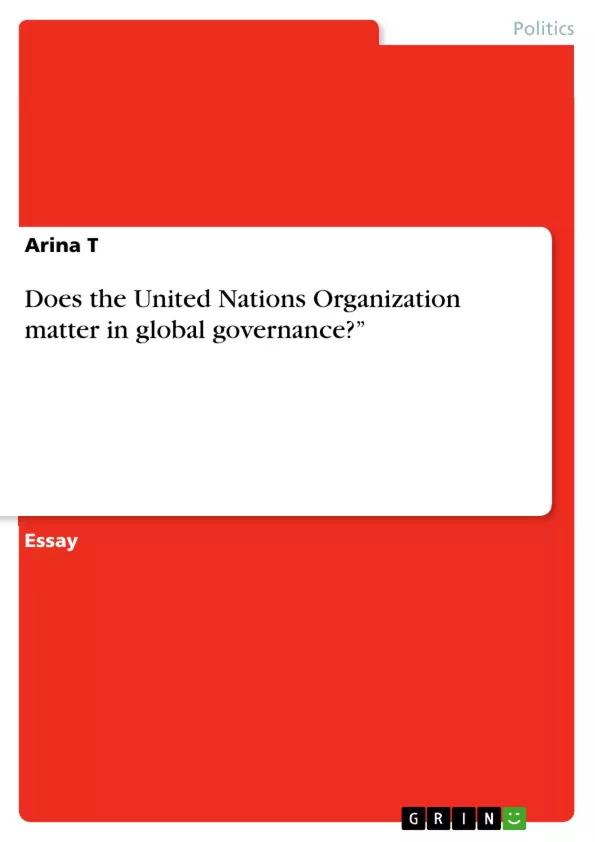These days Globalization is on everyone’s lips. Technical progress and international trade connect humanity in a way it was never connected before. We enjoy the convenience of being able to purchase foreign goods in domestic supermarkets; access voices from around the world on the Internet and even travel relatively cheaply to faraway regions ourselves. But on the other hand, we are concerned about domestic companies outsourcing to foreign countries (in order to take advantage of foreign law and labor) and decisions that are made abroad, because we know about the; as Kofi Annan, former General-Secretary of the United Nations, put it in his Nobel Prize speech; “Butterfly Effect of human activity” [nobelprize.org].
The inevitable transnationalization of troubles we face today (such as environmental issues like the Global Warming that affect every single inhabitant of the planet, the Global Financial Crisis of 2008, international organized crime groups whose actions cut across national borders and many more) can logically be handled best from a transnational or respectively supranational position. The keyword is Global Governance.
Within this paper I will examine the importance of the United Nations Organization (also referred to as “United Nations”, “UNO” and “UN”) in regard to Global Governance (also called “GG” later on). In order to do so, I will first have a closer look on the concept and structure of Global Governance and leave the analysis of the United Nations to the main part of the essay. There I will take a look at the UN’s mission and position in the global community based on concrete examples. And finally I will formulate a conclusion which includes the answer of the lead-question.
Table of Contents
- Introduction
- Global Governance
- Actors of International Relations
- Types of Institutions
- The United Nations Organization
- Origins and Philosophy
- The Cold War and the UN
- Decolonization and the UN
- Conclusion
- Sources
Objectives and Key Themes
This paper examines the importance of the United Nations Organization in the context of global governance. It explores the concept and structure of global governance, analyzes the UN's mission and position in the global community, and ultimately seeks to answer the question: "Does the United Nations Organization matter in global governance?"- Global governance and its actors
- The United Nations Organization and its structure
- The role of the UN in the Cold War
- The UN's involvement in decolonization
- The effectiveness and challenges of the UN in global governance
Chapter Summaries
Introduction
The introduction sets the stage by highlighting the increasing interconnectedness of the world through globalization and the rise of transnational issues that require global governance. It introduces the United Nations Organization as a key actor in this context and outlines the paper's objectives and approach.Global Governance
This chapter provides a comprehensive definition of global governance, discussing the key actors involved in international relations, including states, intergovernmental organizations (IGOs), and non-governmental organizations (NGOs). It also distinguishes between four types of institutions dedicated to global governance: principles of order, networks, regimes, and organizations.The United Nations Organization
This chapter delves into the origins, structure, and philosophy of the United Nations Organization. It traces its roots to the aftermath of World War II and its mission to promote international peace and security, develop friendly relations among nations, and achieve international cooperation. The chapter explores the UN's decentralized nature and the influence of the Security Council, particularly the permanent members with veto power.The Cold War and the UN
This chapter examines the impact of the Cold War on the United Nations. It highlights the antagonism between the United States and the Soviet Union, which transformed the UN into a platform for propaganda and often hindered its ability to intervene in global conflicts. However, it also acknowledges the role of the UN Secretary General in mediating between the superpowers and preventing a nuclear war.Decolonization and the UN
This chapter explores the UN's role in the decolonization process, noting its ambiguous position and mixed record. It discusses the UN's efforts to promote independence while simultaneously acknowledging the challenges of enforcing sanctions against powerful colonial powers and its inability to effectively resolve postcolonial conflicts.Keywords
This paper focuses on the concept of global governance and its key actor, the United Nations Organization. It explores the role of the UN in handling global issues such as the Cold War, decolonization, and the complex dynamics of international relations. Key themes include the structure of international institutions, the challenges of international cooperation, and the evolving role of the UN in a globalized world.Frequently Asked Questions
What is the role of the United Nations in Global Governance?
The UN acts as a central intergovernmental organization aimed at maintaining international peace, security, and cooperation among states to handle transnational issues.
How did the Cold War affect the UN's effectiveness?
The antagonism between the US and the USSR often paralyzed the UN Security Council due to the use of veto power, turning the organization into a platform for propaganda.
What are the different actors in International Relations?
Key actors include nation-states, intergovernmental organizations (IGOs) like the UN, and non-governmental organizations (NGOs).
Did the UN play a role in decolonization?
Yes, the UN promoted independence for colonies, although its record is mixed due to challenges in enforcing sanctions against powerful colonial powers.
What is the "Butterfly Effect" mentioned by Kofi Annan?
It refers to the idea that in a globalized world, human activity in one part of the planet can have significant, often unpredictable consequences elsewhere.
- Arbeit zitieren
- Arina T (Autor:in), 2011, Does the United Nations Organization matter in global governance?” , München, GRIN Verlag, https://www.grin.com/document/190055



